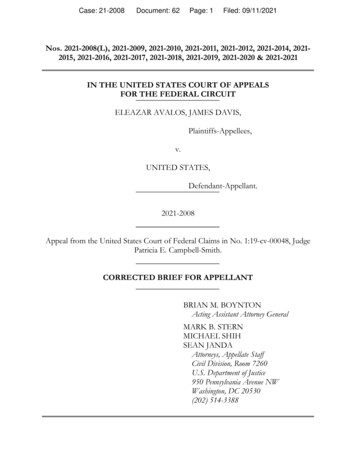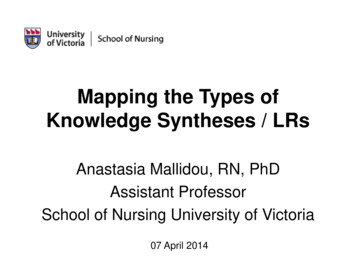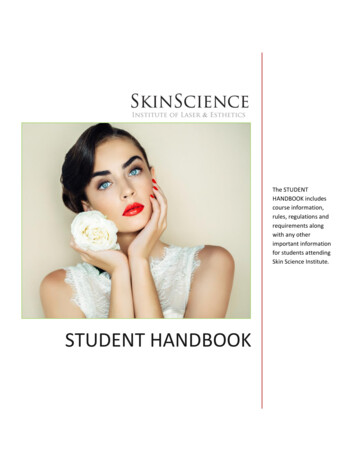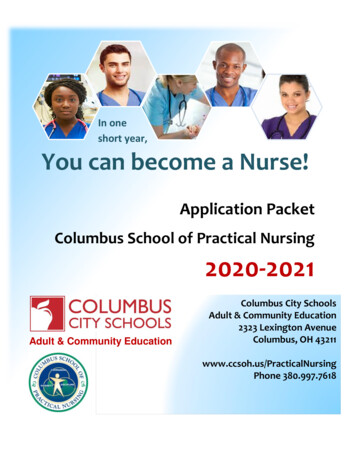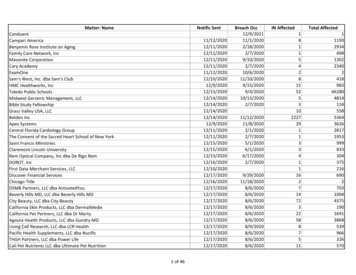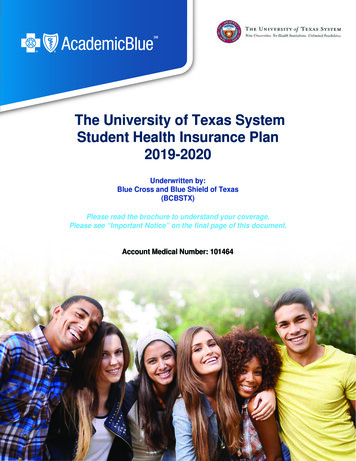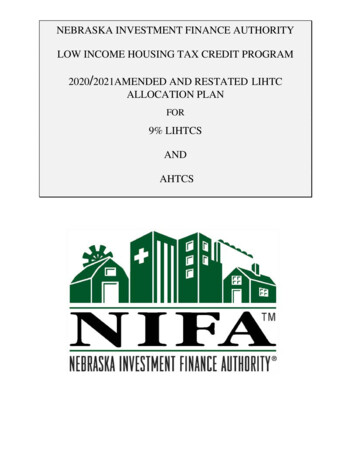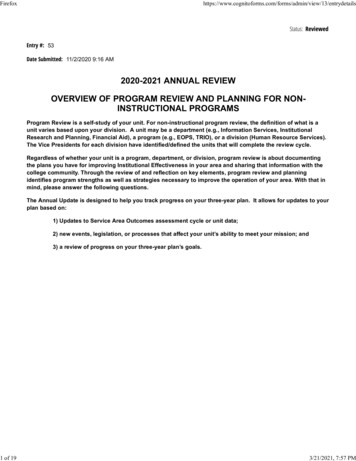
Transcription
Firefox1 of /entrydetails5311/2/2020 9:16 AM2020-2021 ANNUAL REVIEWOVERVIEW OF PROGRAM REVIEW AND PLANNING FOR NONINSTRUCTIONAL PROGRAMSProgram Review is a self-study of your unit. For non-instructional program review, the definition of what is aunit varies based upon your division. A unit may be a department (e.g., Information Services, InstitutionalResearch and Planning, Financial Aid), a program (e.g., EOPS, TRIO), or a division (Human Resource Services).The Vice Presidents for each division have identified/defined the units that will complete the review cycle.Regardless of whether your unit is a program, department, or division, program review is about documentingthe plans you have for improving Institutional Effectiveness in your area and sharing that information with thecollege community. Through the review of and reflection on key elements, program review and planningidentifies program strengths as well as strategies necessary to improve the operation of your area. With that inmind, please answer the following questions.The Annual Update is designed to help you track progress on your three-year plan. It allows for updates to yourplan based on:1) Updates to Service Area Outcomes assessment cycle or unit data;2) new events, legislation, or processes that affect your unit’s ability to meet your mission; and3) a review of progress on your three-year plan’s goals.3/21/2021, 7:57 PM
Firefox2 of /entrydetailsHealth ServicesStudent Health Centers, Behavioral Health CounselingServices, and Health PromotionStudent ServicesPatrick s/healthpromotion/Patrick SavaianoInterim DirectorKimberlee AhingerAdministrative AssistantLenka SchalkleHealth Services SpecialistStaffingUse the link provided to help answer the staffing questions below.Link: Permanent Employees Staff CountThis form requires a login and password to access. Please use your Palomar email and password to log in.3/21/2021, 7:57 PM
Firefox3 of /entrydetailsFull-Time StaffPart-Time Staff7.000.006.000.000.000.001.000.00Short Term Staff 1 Nurse Practitioner certified; 1 Medical Director; 4 College Registered Nurses; 1 Student WellnessAdvocacy Group (SWAG) CoordinatorStudent Workers 4 SWAG students; 1 FWS for SWAGContract Adjunct 4 Behavioral Health CounselorsYes. The former Director of Health Services retired in December 2019 and the Assistant Director of Behavioral HealthCounseling Services has taken the role of Interim Director. The Student Health Centers (SHC) hired a full-timeAdministrative Specialist I, a vital position for managing SHC reception and front desk responsibilities. Our operationshave continued to run smoothly as we offer the same services virtually as we did on-site, with the exception of certainmedical procedures that can only be accomplished in person.Program/Unit DescriptionYes, due to COVID-19 and the Stay at Home Order issued by CA and the County of San Diego, all of our services(administrative and clinical) have transitioned to remote and telehealth platforms. Our administrative team answers callsvirtually through Palomar District issued laptops and our providers meet with students for nursing, primary care, andbehavioral health visits via phone and HIPAA-compliant Zoom.Reminder: Data does not autosave. Save this content before moving to the next section or closing form.3/21/2021, 7:57 PM
Firefox4 of /entrydetailsSERVICE AREA OUTCOMES UPDATEGOT SERVICE AREA OUTCOMES?Outcomes are statements written in support of student learning to show direct support (instruction) or indirectsupport (services) provided on campus. Assessment is the way we measure how well we are achieving ouroutcomes.For non-instructional areas, outcomes are called Service Area Outcomes (SAO).So, what is an SAO?A Service Area Outcome (SAO) is a statement about what a client will experience, receive, or know as a result of agiven service. Clients can be students, faculty, staff, or community members.As part of our three-year planning and review cycles, all non-instructional units are asked to:identify at least two SAOs,develop a plan and assess their SAOs,reflect on the results,and take action, as necessary.Palomar has adopted Nuventive Improve (previously named TracDat) as our official repository for SLO and SAOAssessment information.Review and/or define your SAOs and assessment plans and ensure they are entered in Nuventive Improve by:1) Login to Nuventive Improve (previously TracDat) 8/10/tracdat/. Your Palomar username and password is your login.2) Check your SAOs for currency and sunset any SAOs if you no longer plan to assess them.3) Revise or edit your current SAOs by revising their wording and/or updating the assessment and assessmentresults.NEED HELP?Nuventive Improve:1) If you need help with anything Nuventive Improve related such as login, unit identification, entering SAO info,contact Marti Snyder at msnyder2@palomar.edu.2) Check out this video on how to enter SAOs in Nuventive Improve: https://youtu.be/b1sRa68wm4cDefining and Assessing SAOs:Not sure if your SAOs make the grade? Need some help writing an SAO? Not sure about how to assess your SAOs?1) Hartnell’s SAO Guide is a nice resource! Thank you Hartnell!2) Contact Michelle Barton at mbarton@palomar.edu. We have a resource support team to help.A template for entering SAOs can be found on the IR&Ps Non-instructional Program Review and Planning website3/21/2021, 7:57 PM
Firefox5 of /entrydetailsYesIf you have completed any SAO assessments over the past year, summarize what you learned from theassessment and what improvements you have implemented or plan to implement as a result of your SAOassessments. If you have not completed SAO assessments, document why (e.g., SAO was assessed lastyear).Over 90% of students surveyed will indicate that theywere satisfied with services received at the StudentHealth Centers (medical clinics).Assessed100% of our students who completed the satisfaction survey were satisfied with our services. We had a significantincrease in the number of surveys completed from Fall 2019 to Spring 2020 due to our department efforts to increasesurvey completion. One of those efforts included updating the survey from 13 questions in Fall 2019 to 5comprehensive questions in Spring 2020. However, from Spring 2020 to Summer 2020 we had a decrease incompletion due to the impacts of COVID-19 which resulted in fewer student appointments.Ensure wait times for Initial, Non-Urgent Appointments atBehavioral Health Counseling Services are made within areasonable timeframe according to professionalstandards.AssessedFor the 2019-20 academic year, the average wait time for a student to be scheduled with an initial, non-urgentappointment was under 10 business days for all of these visit types. As a result of our efforts to ensure appointmentsare made in a timely manner, BHCS did not have to put students on a waitlist at any point for the entire academicyear.3/21/2021, 7:57 PM
Firefox6 of /entrydetailsThe total number of visits for the Student Health Centers (medical clinics) decreased in FY 2019-20 by 21.7%. Much ofthis decrease can be attributed to the transition off-site in March 2020 due to COVID-19. Demand for medicalappointments dropped dramatically at that time. Staffing patterns changed dramatically as well with the closure of oursatellite offices in ESC, RB, and FB, so all short-term hourly RNs and NPs were no longer staffed/scheduled. BehavioralHealth Counseling Services (BHCS) visits continued to increase (9.1%) despite the transition to remote services inMarch 2020. This increase in BHCS visits mirrors national trends of annual increases in college students requesting andseeking mental health support on campus. The addition of Assistant Director, BHCS who provides regular outreach tostudents, staff, and faculty has also built more awareness of the services provided at BHCS amongst students.This past year, our Interim Director and Administrative Assistant took a close look at staffing schedules to ensure ourresources were being used optimally, and this allowed our department to make adjustments to improve our operationalbudget. These important changes will help to ensure Health Services maintains a sustainable and healthy budget, whichin turn allows us to continue providing excellent health, wellness, and safety resources for our students.Prior to March 2020, the Student Health Centers, Behavioral Health Counseling Services, and Health Promotionresources provided by our department continued to be in high demand. After transitioning to remote work due toCOVID-19, there was a complete shift in service delivery for all of Health Services that occurred in March 2020. Whilethe demand for appointments at the Student Health Centers (medical clinics) decreased significantly, there was animmediate and pressing need for the Interim Director and medical team to support the Emergency Operations Center inmitigating the spread and impact of COVID-19. Our full-time NP and RN continued to meet with patients via telehealthplatforms, however their efforts were primarily focused on planning/researching the emergence of COVID-19 and toassist with the District's goal of keeping students, staff, and faculty safe.Behavioral Health Counseling Services has noticed an annual increase in demand for services since 2015-16. This trendcontinued for 2019-20 (increase of 9.1%) despite the transition to working off-site and providing exclusively telehealthservices. The outcomes of telehealth for BHCS have demonstrated it effectiveness for students and their well-being, andhas maintained access to services during this the pandemic, which has been a particularly stressful time for ourstudents.Health Promotion continues to provide outstanding outreach and well-being resources for our students. In Fall 2019,1169 students, staff, and faculty were provided with health and wellness resources during class presentations and otheroutreach events, including QPR Suicide Prevention training during the Fall Plenary, LGBTQ awareness event, Love ona Leash pet therapy, Domestic Violence awareness event, and Stress Awareness Day event. In Spring 2020, prior totransitioning off campus due to COVID-19, 407 students were reached during class presentations and other outreachevents. Working remotely, our team initiated an outreach and engagement plan to reach as many students as possibleand inform them of how our services are still available to them via telehealth. In Summer 2020, our outreachprogramming continued virtually and reached an additional 81 student participants. Students participated in the "SummerSelf-Care" workshop series, had their medical and COVID questions answered during "Thursdays with the Health CareTeam," and received mental health support in BHCS workshops "Coping with COVID" and "Dealing with Uncertainty".3/21/2021, 7:57 PM
Firefox7 of /entrydetailsHealth Services very quickly implemented HIPAA-compliant virtual appointments for all services after moving allemployees off-site due to the pandemic. Nursing, Primary Care, and Behavioral Health visits are all conducted via thistelehealth and all outreach completed by Health Promotion is conducted virtually. Our Administrative Team workedclosely with Information Services to adopt new methods for receiving and making phone calls with students so thataccess to healthcare continued as seamlessly as possible. Along with the entire District, Health Services has addressednovel problems with innovative solutions to ensure that our students continue to receive the high quality healthcare theydeserve. Our team has sought professional legal and ethical consultation for the provision of telehealth, which will be anongoing service provided even after an eventual return on-site.During the 2019-20 academic year, Health Services also achieved a major change to AP 5030 regarding the StudentHealth Fee. Effective during Summer 2020, the fee was raised to the maximum allowed by the Chancellor's Office (anincrease of 2/student during Fall, Spring, and Summer terms). Additionally, the language of the AP was changed so thatthe SHF will be raised to the maximum amount allowed by the Chancellor's office automatically (i.e. for Governing Boardreview as opposed to vote). These changes (detailed in the next PRP section) will contribute substantially to ensuringHealth Services maintains a balanced budget even as the demand for behavioral health services continues to increase.The Assistant Director, Behavioral Health Counseling Services serves as one of the core members of Palomar'sBehavioral Intervention Team (BIT). Working with Campus Police, Student Life and Leadership, and an externalconsultant, the BIT is actively looking at existing board policies and procedures related to managing emergencies anddetermining what needs to be updated, created, or deleted. Any recommendations from the BIT will be moved throughthe Shared Governing process as appropriate.Reminder: Data does not autosave. Save this content before moving to the next section or closing form.3/21/2021, 7:57 PM
Firefox8 of /entrydetailsReview the goals listed on your comprehensive review and sumarize progress you have made on the strategiesfor implementation. If your unit has experienced challenges implementing the goals, describe those challenges.Click on " Add Goal" below for each additional goal.The "no show" appointment rate for Behavioral HealthCounseling Services will mirror (or be less than) theAmerican College Health Association average of 8% (ratein 2017-18 was 11.7%).In progressBHCS continues to make progress in efforts to reduce the rate of No Show appointments. During the Fall 2019semester, the No Show percentage was 10% for all visit types. During Spring 2020, the No Show percentage was 7%for all visit types and in Summer 2020, the percentage was 5%. It should be noted that not all visit types carried a NoShow percentage that was greater than the national average of 8%. In Fall 2019, only BH Case Management Visits(26%) and BH Intake Visits (15%) were above 8%. In Spring 2020, only GH Brief Telehealth Screenings, BH IndividualPhone Sessions, and BH Intake Visits were above 8%. And in Summer 2020, only BH Teleheatlh Intakes (9%) wereabove 8%.Analyzing the data suggests that students are more likely to No Show for Non-Urgent, Initial appointments (i.e. BriefScreening or Intake appointments) before they have established a relationship with a counselor. This is perhaps dueto changing their mind or deciding not to pursue therapy services for some other reason. Once the therapeuticrelationship has been established with a behavioral health counselor, students are much more likely to show up totheir follow-up appointments or contact BHCS to formally cancel the appointment.The national average of No Show rates for behavioral health appointments (ACHA) is 8%. So inherently, No Showsare an element of providing psychotherapy services as clients may schedule an appointment and later decide not toattend if they are feeling particularly well OR particularly ill at the time of the appointment. Additionally, as acommunity college where 100% of students commute to campus (as opposed to a residential campus), there aremore barriers for students to commute to campus and attend their appointments.The addition of telehealth services has helped to reduce the number of No Show appointments, as evidenced by thedeclining No Show rates in Spring 2020 (7%) and Summer 2020 (5%). These visits do not require the student tocommute to campus in order to attend, which is one reason they may improve access and decrease No Shows orappointment cancellations. BHCS will continue to provide telehealth offerings as appropriate even when we return toon-site work, and this will hopefully continue to help us achieve this goal.90% (or more) of Initial, Non-Urgent Appointments atBehavioral Health Counseling Services will be madewithin 10 business days.In progressFor the entire 2019-20 academic year, the average wait time for a student to be scheduled with an initial, non-urgentappointment was under 10 business days for all of these visit types. As a result of our efforts to ensure appointmentsare made in a timely manner, BHCS did not have to put students on a waitlist at any point for the entire academicyear.3/21/2021, 7:57 PM
Firefox9 of /entrydetailsThe report used to gather data from our Electronic Medical Record (EMR) did not allow us to calculate the percentageof appointments scheduled within 10 business days, only the average number of days for each appointment type.Therefore, we have implemented a new system starting Fall 2020 to gather this data in a spreadsheet on an ongoingbasis so we can better ensure that we are reaching our goal of 90% of initial, non-urgent appointments beingscheduled within 10 business days.The average number of business days in which initial, non-urgent appointments at BHCS were scheduled for the2019-20 academic year are as follows:Fall 2019BH Intake Visit 8 daysSpring 2020BH Brief Triage Appointment 4BH Intake Visit 8BH Brief Telehealth Screening 5BH Telehealth Intake 4Summer 2020BH Brief Telehealth Screening 6BH Telehealth Intake 7Create a sustainable and balanced budget for HealthServices that can support current staffing levels andcontinue to meet the growing demand for BehavioralHealth Counseling Services.In progress3/21/2021, 7:57 PM
Firefox10 of /entrydetailsDuring the Fall 2020 semester, the former Director of Health Services (now retired) and Assistant Director of BHCSinitiated the process of increasing the Student Health Fee to the maximum amount allowed by Chancellor's Office.During Spring 2020 semester, Assistant Director of BHCS (now the Interim Director of Health Services) began theShared Governance process of proposing changes to Administrative Procedure 5030 (AP 5030) to increase StudentHealth Fee revenue and reduce any losses from unapproved fee waivers.As of May 2020, the Student Services Planning Council, the Strategic Planning Council, and the Policies andProcedures Committee approved the proposed changes to AP 5030. The following changes to AP 5030 will takeeffect in Fall 2020:1) Student Health Fee exemptions were removed for students taking Credit classes at sites that do not have a studenthealth clinic and students exclusively enrolled in distance education.2) Student Health Fee waivers must be approved by the VP of Student Services or Director of Health Services.The Palomar College Governing Board reviewed the changes to AP 5030 and the health fee increase for onlinestudents during the 2019-20 academic year and did not have any opposition to these changes. As a result of theseefforts, the Student Health fee increase ( 2 increase for Fall, Spring, and Summer semesters) will be implementedstarting Summer 2020 and AP 5030 changes will be implemented starting Fall 2020. These changes will greatlyincrease the revenue stream for the Health Services department.During the Spring 2020 semester, the Interim Director and Administrative Assistant of Health Services instituted biweekly budget review meetings to identify areas where Health Services' operational budget could be reduced. As aresult of these meetings.1) A presentation was created and provided to VPSS and VPFA regarding the Health Services budget to forecast areasonable set of expectations regarding income and expenses for the 20/21 and moving forward.2) Recommendations were made and approved to reduce operational hours to align more with other Student Servicesareas to reduce need for after hours staffing. Additionally, reduced hours in Rancho Bernardo clinic due to lowutilization rate.3) Recommendations were made to hold off on hiring vacant full time staff positions until the Health Services budgethas stabilized.4) Recommendations made to decrease stock of prescription medications to only those that are being most utilized bystudents.Health Services historically had a good cushion of contingency funds that has been depleted over the past severalyears. There have been annual increases in salaries and benefits costs as well as demands for expansion of theStudent Health Centers (medical) services (increased hours, presence in each of the education centers) without anyincreases to Student Health Fees revenue.The development of the Behavioral Health Counseling Services program has been supported by one-time Allocationsfrom the Chancellor's Office (distributed amongst all CCCs to support mental health programming for students) as wellas awards for two competitive Mental Health Services Grants. In order to maintain the services that BHCS provides,long-term funding solutions must be determined. The Student Health Fee revenue will likely not be adequate tomaintain BHCS, particularly since demand and need for mental health services amongst college students is risingyear after year.Successful in making important changes to the Student Health Fee (increase of 2/semester) and AP 5030 toincrease Health Services revenue.Stabilize Staffing - Convert short term hourly to contractpart time positions and convert BH Counselor adjunctfaculty positions to classified positions.Not Started3/21/2021, 7:57 PM
Firefox11 of /entrydetailsDue to financial constraints, we have placed a hold on hiring permanent staff including any vacant positions until theHealth Services budget is stabilized and has enough reserve to support new hires. The demand for services,particularly behavioral health counseling, continues to rise and therefore we are considering ways to allocate therequired resources to meet the demand/need.Establish a Mental Health Internship Program forBehavioral Health Counseling ServicesIn progress1. Assistant Director of BHCS established MOUs with graduate programs in Social Work at CSU San Marcos and SanDiego State University to begin accepting their graduate students as interns for the Fall 2020 semester.2. AD of BHCS attended the Site Agency Fair to provide information about Palomar College and BHCS to prospectivegraduate student interns.3. Five graduate students were interviewed and three were offered positions to begin training at BHCS in the Fall2020 semester.4. Mental Health Allocation funds from the Chancellor's Office were earmarked for the physical expansion of BHCS toinclude two additional offices. The construction of these offices began in Summer 2020 while everyone is workingremotely. Once back on-site, these offices will help to house the interns and help BHCS to continue to meet the risingdemand for mental health services on campus.This is the first training program that Behavioral Health Counseling Services has ever had, and therefore there will bea lot of learning and adjustments that need to take place with the our protocols, policies, and procedures.The inaugural BH training program will begin in Fall 2020 as we welcome three MSW graduate student interns. One isa graduate student at CSUSM and two are graduate students at SDSU. These additional members to the BHCS teamwill assist in providing an array of mental health and outreach services to students. They will develop liaisonrelationships with other departments on campus in order to better serve Palomar students, especially our mostvulnerable students.Health Services directly supports the health and well-being of Palomar College students which, in turn, supports theiracademic success, retention, and matriculation at Palomar. With a mental health internship/training program set to beginduring the Fall 2020 semester, the Interim Director of Health Services will support these interns in developingrelationships with other departments on campus who serve our some of our most vulnerable students. These liaisonrelationships will provide direct support to students, staff, and faculty who work with historically underrepresentedstudents and will serve as a pipeline for referrals to BHCS if needed.Our department has been very creative and has worked together to ensure students continue to have access to basicmedical services, behavioral health counseling services, and health promotion/outreach programming even aftertransitioning completely off-site due to COVID-19. We have prioritized creating effective and confidential services utilizingHIPAA-compliant Zoom and the patient portal provided by our Electronic Medical Record. Additionally, the departmenthas identified ways to reduce operational costs and increase revenue to ensure we have a healthy budget movingforward.Reminder: Data does not autosave. Save this content before moving to the next section or closing form.3/21/2021, 7:57 PM
Firefox12 of /entrydetailsCongratulations! You are nearing completion. In this section, you will consider the resources you need to implementyour three-year program review plan and/or address any findings from your assessment of your discipline.The section is organized into the following four parts:PART 1: Staffing Needs (Faculty and Additional Staff)PART 2: Budget ReviewPART 3: Technology and Facilities NeedsPART 4: One Time Request for Other Needs (NonTechnology Equipment, Supplies, Operating Expenses, Travel)Reflect upon the three year plan you created above, your current operations, and any upcoming factors(retirements, changes in legislation, and changes in policies or procedures) that will impact your unit. How willyou allocate resources to implement your plan? Describe additional resources needed to improve theeffectiveness of your unit/program. All resource requests must be aligned with the College’s Strategic Plan2022.Summarize any reallocation/re-organization of resources you are making based upon your three-year plan, yourcurrent operations, and any other factors (e.g., legislation). Describe the impact of the reallocation of resourcesto your unit.3/21/2021, 7:57 PM
Firefox13 of /entrydetailsYesIf you are requesting STAFF, please fully complete this section. If not, you can skip to the next resource section.Click " Add Staff, CAST, AA request" below for each additional request.When considering the funds required for a position, consult the HR website for position salary schedule andthe Benefits Worksheet for additional costs related to benefits for the position.College Registered NursePart TimeWe were previously informed that the SHC is required to staff an RN and/or an NP at each health center on thevarious campuses to maintain/achieve Center status.HR and the Unions have mandated that any short term employee working at that status for 2 years or more need tobe converted to a permanent position.N/AYesStudent Health Fees4:24:3Continue to utilize short term employees to staff the Student Health Centers at the RB, Fallbrook and Escondidocampuses. Continue to provide telehealth services for students to save staffing resources.CAST - SHC Office ManagerFull Time3/21/2021, 7:57 PM
Firefox14 of /entrydetailsReorg/restructure; the SHC Administrative Assistant essentially functions as the "Clinic/Office Manager" to guide ourdepartment operations, including work flow, staffing, budget, absence reporting, and time off requests. This positionassists the Director and Assistant Director in daily operations of the clinic. This position would continue to support theDirectors, however it would help to eliminate duplicate efforts of daily operations, provide more time for meetings andadministrative projects, MOU's, etc.YesSHC Fees - 1812090Promote efficiency in the SHC.4:24:3Continue to conduct business as usual.CAST - Behavioral Health Counselor - Equity Focus (Latinx / Chicanx Students, preferably Bilingual Spanish)Full TimeOur BHCS providers are currently comprised of adjunct faculty who are hired on a per semester basis to provideconfidential psychotherapy services for Palomar students. While this staffing structure provides a great deal offlexibility in hiring and scheduling the individual counselors on a contractual basis, it does not provide adequatestability or coverage for BHCS to manage student needs throughout the week. Additionally, there is a growingdemand for mental health services nationally and locally amongst college students. It is extremely important thatcounselors are hired with our diverse student population in mind to promote equity and access to caring professionalswho specialize in treating our most vulnerable and underrepresented students. With the majority of our student bodyidentified as Latinx, this position would serve an extremely important role in serving and retaining a large number ofPalomar students.By reorganizing/restructuring Behavioral Health Counseling Services, we will be able to provide more adequate andcomplete coverage for behavioral health concerns that arise for our student population. Demand for servicescontinues to increase and it is anticipated that in the wake of COVID-19 will be a prolonged impact on student mentalhealth, which was already facing considerable challenges prior to the pandemic. Having the support of a morecomplete, stable BH counseling staff will allow BHCS and the District to demonstrate its prioritization of our studentsmental health
college community. Through the review of and reflection on key elements, program review and planning identifies program strengths as well as strategies necessary to improve the operation of your area. With that in mind, please answer the following questions. The Annual Update is designed to help you track progress on your three-year plan.
